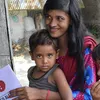This Mumbai NGO saved over 5,000 girls from human trafficking in 26 years
Triveni Acharya led Rescue Foundation NGO has been working since the early 90s, rescuing more than 5,000 girls from sex trafficking across several Indian cities.
Women and child trafficking have been deemed as a crime by the Indian judicial system. However, the menace does not seem to cease. Rescuing several women and girls in Mumbai is social worker Triveni Acharya, Founder of a non-government organisation (NGO) Rescue Foundation.
Rescue Foundation has been working since the early 90s and has rescued more than 5,000 girls from sex trafficking, across India, including in Mumbai, Pune, Delhi, Agra, Bihar, and Rajasthan.

Triveni Acharya (Image: Asian Age)
Explaining to The New Indian Express’ Edex Live about how her foundation rescues girls, Triveni said,
“When we receive any information, we first try to track them down, inform the police and then rescue them. Once the girls are older, around 25 years, they go out of business. So, there's always a demand for younger, virgin girls. Whenever a new girl is brought in, we get information about it. They're referred to as Naya maal (new product).”
According to Triveni, one can identify that the girls are new, as they are dressed up with heavy makeup and look scared. The spies working for the NGO try to talk to these young girls first, as it is important to get their consent before rescuing them legally.
If they agree to the fact that they have been forced into the profession, an FIR is filed with the police.
The beginning of the fight
Triveni and her husband Balkrishna Acharya moved to Mumbai in 1993 after her husband retired from 12 years of military service. The 55-year old took up a job as a journalist, where one of her assignment required her to visit Falkland Road in the Grant Road area – one of Asia’s largest red-light areas.
Speaking to Asian Age, Triveni said,
“I wasn’t even aware of prostitution and human trafficking. I used to see some girls standing on the road, wearing dark lipsticks and provocative clothing, but I thought they are doing it willingly. It was my husband who educated me about it.”

Triveni Acharya (Image: Edex Live)
On an assignment to cover the late Bollywood actor Sunil Dutt who was getting rakhi tied by the sex workers on the occasion of Rakshabandhan, Triveni came across a 14-year-old girl, whom she mistook to be someone’s daughter. However, she turned out to be a sex worker bought from Nepal to Mumbai, promising a job but later sold to the pimps.
“That day, we realised that we needed to do something to help other girls in the same situation. So, my husband wrapped up his business and began rescuing girls full time, and I continued to work to maintain contacts, and sustain us financially”, Triveni told Asian Age.
Since then, Triveni-led NGO, Rescue Foundation has been fighting all the odds to save the girls.
After the rescue
Once the girls are rescued from the brothels, they are taken to a shelter where several health check-ups including HIV and pregnancy tests are carried out. To make sure the girls are mentally capable of coming out of trauma, they are also given counselling and proper nutrition.
If any of the girls rescued are below 16 years of age, they are presented before a child welfare committee and are also reunited with their families.
The NGO also submits all the information about the rescued girls to the court, which monitors the progress every month. In case the families are responsible behind trafficking their children, they are kept in the shelter until they turn 18 for nearly six months after which, they are sent back to their states, mostly to engage with their partner NGOs.
(Edited by Suman Singh)
Do you have an interesting story to share? Please write to us at [email protected].To stay updated with more positive news, please connect with us on Facebook and Twitter.









![[The Turning Point] How pivoting from a SaaS to marketplace model worked for B2B unicorn Zetwerk](https://images.yourstory.com/cs/2/70651a302d6d11e9aa979329348d4c3e/Zetwerk-1630653519416.png?mode=crop&crop=faces&ar=1%3A1&format=auto&w=1920&q=75)